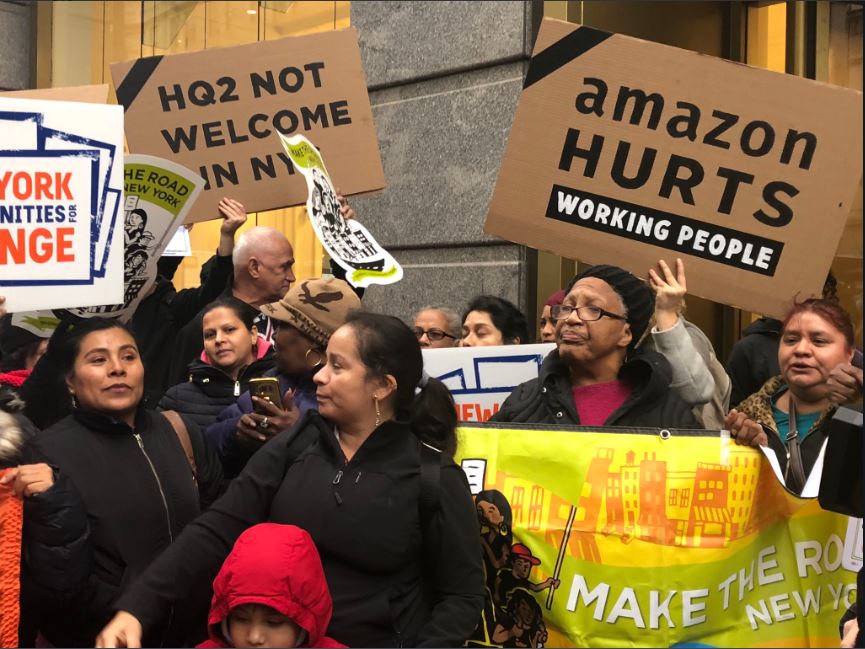Amazon’s Acropolis Will Hurt NYC Residents
Amazon’s new HQ2 potentially hurts New Yorkers as cost of living in Long Island City and Queens will likely increase (Courtesy of Flickr).
By Sean Franklin
The long search for the location of Amazon’s second headquarters has finally concluded. In the end, Amazon did not send its promised 50,000 jobs to any one city but instead split it up between two. 25,000 jobs will be located in Arlington, Virginia, right outside downtown Washington, D.C. (and right next to my hometown of Alexandria). Another 25,000 will be sent to Long Island City, Queens, right across the East River from Midtown Manhattan.
There are a few key takeaways from this move. First, many observers speculated that Amazon would send its new HQ to an inexpensive, low-tax state, forcing states like Washington (where the company is currently located) and New York to wake up to the fact that their high state and local taxes were deterring business.
But clearly, this prediction did not come true. Virginia and New York are two of the highest-tax states in the nation. Fears that Amazon would punish Seattle for raising taxes by moving to somewhere like Indianapolis were way overblown. Agglomeration effects and the existence of an educated workforce are more important than tax rates could ever be.
The struggling metropolises around the country which hoped to lure in Amazon with eye-catching spectacles or sweetheart deals never stood a chance. Cities all over the country pulled insane stunts to attract the company. Stonecrest, Georgia’s city council voted to rename the city Amazon, Georgia. Fresno, California, offered the company voting seats in the city government.
Governments nationwide offered ludicrously large tax breaks reaching into the billions of dollars. Most notably, Newark, New Jersey offered over $7 billion in tax breaks and grants to Amazon should it move there – 10 times more than Arlington offered.
And yet, it didn’t make a difference. Cities that so shamefully prostrated themselves before a giant corporation and got nothing for it should do some serious soul-searching in the coming weeks and months.
Finally, we should consider the effect that this will have on D.C. and NYC. The picture doesn’t look good. Amazon’s second headquarters could have been transformative in a struggling city like Detroit or Newark. It could have been easily absorbed in still-inexpensive markets like Dallas or Nashville. In a place like Arlington or New York, it will likely be destructive. D.C. and NYC are two of the wealthiest and best-educated cities in America. Places like New York City don’t need Amazon – they have enough jobs as it is.
Contrary to popular belief, the addition of 25,000 high-paying jobs won’t make New York any better a place to live. In fact, it will probably make it worse. A 2017 paper from the London School of Economics found that, in cities with inflexible housing markets (like New York), the addition of tech jobs actually reduces real wages because rents and other living costs go up significantly. Rents in New York City are already the highest in the nation. With 25,000 new well-paid tech workers moving in, they will only get higher.
Therefore, for Governor Andrew Cuomo to offer Amazon over a billion dollars in tax breaks to move to New York (and to humiliate himself by offering to change his name to “Amazon Cuomo”) is appalling. That billion dollars should be used to fix the subway system. It should be used to improve New York’s public schools. Instead, it is being given away to a huge corporation in order to make life worse for ordinary New Yorkers.
Amazon made the search for its second headquarters an unparalleled public spectacle, pitting states and cities against each other in a brawl to bag the big prize. But before throwing their hat into the ring, city governments should have asked themselves: is this a prize we really want?
Cuomo and his ilk should have considered these questions before throwing billions of dollars at Amazon. The cost to New York City will be high. The payoff? Not high enough.
Sean Franklin, FCRH ’21, is an urban studies major from Alexandria, Virginia.








































































































































































































